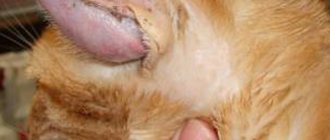Expert advice: How to explain to your cat that your feet are not a toy.
Almost every pet owner has found themselves in a situation where, while relaxing under the covers, they suddenly feel claws and teeth digging into their legs. Sometimes an attack can be predicted, in other cases an unexpected attack can be shocking (especially during sleep). A person’s response, as a rule, is to join a joint game or remove the furry impudent person from the bed; the last option is the most common.
If you've ever tried to stop a wild animal, you know how difficult it is to do so. No matter how charming your pet is or what level of world domination he thinks he has achieved, sudden attacks are annoying and painful.
But why does this cheeky fluffy behave this way? And how to influence his behavior? Experts in the field of pet behavior will help you understand the motives that push most felines to such activity, as well as correct their predatory actions towards your feet.
Kitten bites
If a kitten bites, then most likely it is scratching its teeth. When little kittens start teething, they develop the urge to bite. Your little pet may bite your pants or cling to your socks, and this is quite natural for his age. But for the owner, you need to remember one thing: if you don’t teach your kitten to bite at an early age, he will continue to bite your legs even when he grows up.
To avoid this, immediate re-education should begin.
Buy a rubber ball or a soft mouse for your baby so that your pet can chew on it when he wants to bite. As soon as your pet starts biting you, distract him with a toy, focusing his attention on it.
Miseducation
All of the above causes of aggression are easily eliminated. To wean a cat, it is enough to eliminate the reason why it bites hands. It is much worse if the problem lies in upbringing - this is the most difficult case, so we will put it in a separate category. For clarity, let's outline the situation.
The new owners have just acquired a small, fluffy and cute kitten. Playing with him is a great pleasure. His attempts to bite and scratch his owner's hands amuse the latter more - his sharp but weak teeth do not cause much harm, since they cannot really bite through the skin.
But time passes. The habit of using claws and teeth while playing with the owner is reinforced - this is already part of the behavior. But a one-year-old cat has sharp claws and teeth that can easily cause serious injuries to a person. It is at this moment that the owner begins to worry - no one likes getting deep scratches. Moreover, the cat transfers the habits acquired while playing with an adult to children. He bites hard and can do a lot of damage.
An adult cat is bored
An adult cat may bite out of boredom. If a pet wants to attract your attention, it will jump out from around the corner, bite your legs and run away. The solution to this small problem will depend only on the owner. You can buy or make a new toy for your animal that he will like.
In addition, you should pay attention to your pet. A domestic cat is not part of the interior, it is a full-fledged member of the family that also needs attention.
Host actions
So, we have found out why the cat rushes to his feet and bites, now we will find out what to do in such a situation - how to wean him from this habit. Remember, whatever the reason for strange behavior, there is no need to justify it and let things take their course. Aggressive intentions must be stopped at the very beginning.
Take the advice of experienced breeders and take measures that are suitable specifically for your case:
give a little fluffy dog with itchy teeth a rubber toy that attracts attention (the same method can work with a spoiled, harmful cat); if the problem is a lack of vitamins, review your pet’s diet and supplement it with special supplements; in the event of a sudden “attack”, when not only teeth, but also claws are used, contact a veterinarian - most likely the cat is experiencing attacks of pain associated with the development of some internal diseases; If your pet is walking and mating is not possible, then castrate or neuter him to solve the problem once and for all.
But still, the main reason why a cat bites its owner or owner on the legs is most often the inattentive attitude of breeders towards their pets.
It is necessary to play with the animal and caress it not only while it remains a cute kitten: adult felines need this no less. Spend time with your pets, play with domesticated predators, monitor their health and upbringing - and coping with manifestations of aggression will not be difficult.
- The kitten bites and scratches: why and what to do?
- Aggression in cats and kittens
- What to do if you are bitten by a cat and your hand is swollen
Stress or fear
Frequent leg biting can be caused by stress or fear. If a pet is afraid of something or doesn’t like something, then it will protest in such a way as to attract your attention. This often happens due to frequent changes of place of residence, the appearance of a new animal in the house, or due to the arrival of strangers in the apartment.
In this case, it is necessary to minimize stress in your animal. Show more affection, spend more time together and play more often. The cat should feel that you love it and are completely safe.
Teething
If the owner is bitten by a kitten, then most often the reason for this behavior is teething. In such situations, the baby constantly tries to put something in his mouth, which is quite normal for this age. To prevent a kitten from growing into a naughty prankster, it is important to explain from an early age that this cannot be done.
To help your cat cut teeth faster and stop biting, it is recommended to buy a special rubber toy that your pet can chew on when he wants to “scratch” his gums.
Hunting instinct
The feline can bite the owner's legs due to the hunting instinct. A cat is a predator by nature, and this behavior is typical for it. She can hide under a table or chair and watch your leg for a long time, waiting and choosing the best moment to attack. When you get closer, she may jump out and grab your leg.
Hunting instincts can also manifest themselves when a cat eats food.
If she eats something tasty, a piece of meat or fish, and then you appear next to the bowl. The pet may begin to growl, indicating to you that this is its prey. If the owner does not pay attention to this, he may be bitten directly on the leg. Sometimes it’s impossible to wean yourself off of this. You just have to get used to the hunting nature of your pet and find a peaceful solution to common coexistence.
How to stop a cat from throwing itself on its feet
By following simple tips that will help achieve mutual understanding, you can stop your cat from lunging and biting.
Cat attacks on legs during play are the most common case. To teach your pet to have fun without harming others, it is recommended to do the following:
Avoid rubbing your cat's belly
You can try scratching your chin or the back of your head, starting after just a few seconds. If your cat shows her belly, it usually means one of two things: defensive aggression or relaxation. Even a relaxing cat can become defensively aggressive when its stomach is touched.
Observe all interactions with children's cats
If you have small children, do not allow them to chase, grab, pick up or carry the cat, as this could cause serious injury. Older children can be taught that cats are not toys, but living, sensitive animals. You understand this and should closely monitor your cat.
You can offer your cat more toys and objects to explore, such as mice, balls, pendulum toys, paper bags and boxes. Play with your pet for at least 10 minutes twice a day
But never allow yourself to be bitten on your arms and legs, but use a toy on a stick or rope to imitate “prey.” If your cat likes to ambush legs, you should try to redirect its attention with a toy, throwing it in front of you. Each time, resolutely stop the game as soon as the cat begins to break the rules. You should not hit or spank an animal for rough play - this may be perceived as a continuation of it. Instead of punishment, you can put your pet in its place with a “shower” from a spray bottle or a sharp sound (for example, clapping your hands or a rattle made from a tin can filled with coins). Never try to break free and run away if a cat or cat rushes to its feet
To break out means to behave like prey and provoke the animal to attack again and again. It is better to press the animal to yourself or to the floor for a few seconds so that it cannot continue its actions.
This may sound like strange advice, but cats generally do not respond well to physical or verbal punishment. Playful cats may interpret the response as play and bite harder, while fearful or aggressive cats may think they are being attacked and bite harder. Bored cats may learn that this tactic is a successful way to get a reaction.
Provide a lot of environmental enrichment
Cats in the wild cover a wide range of territory and spend a large amount of time - up to 6 hours - searching for food. One method is to buy a food dispensing toy and feed the cat food exclusively. The cat can then spend his time on the toy and eat every piece of the kibble as it comes out, providing mental and physical stimulation. For cats that don't like such toys, the owner can simply scatter the pieces in different parts of the house. One warning: the cat may start looking for food where there is none, for example, between sofas, behind shelves, etc.
Problems with cat behavior are rarely resolved quickly, so you may have to spend more than one week raising an obstinate pet. To prevent the animal from causing pain, its claws should be trimmed. However, patience and consistency will certainly do the trick.
The cat has grown up and reached puberty
Aggression towards your legs can occur in a cat as a result of puberty. When a pet develops desire for the opposite sex, he may become irritable and nervous. If the animal is lying on the floor and you are looming in front of it, then it is possible that you will be bitten or scratched on the leg.
In this case, during the “hot-hunters”, you can move the cat into a separate room, where no one will disturb her and will not get on her nerves. If you want to permanently rid your pet of aggression during this period of time, then you should go to the veterinary clinic for sterilization or castration.
What to do?
The first step is to understand exactly when an animal is most aggressive: when it is touched, at certain times of the day, after eating, or immediately after going to the toilet. Depending on this, you need to build on the methods of therapy or treatment
- Castration and sterilization are the only humane means for animals that live indoors, without the opportunity to go outside and without a chance to mate. After the procedure, hormones are released in very small quantities, and the animal stops attacking people.
- If your cat is aggressive for a long time for no apparent reason, you need to take him to the veterinarian. In most cases, the cause is illness or injury. The doctor will examine your pet and prescribe medication or pain medications to relieve the animal's suffering or cure it completely. As soon as the pain subsides, the animal will again begin to please its owners with its exemplary behavior.
- If the reason is in the food, you just need to change it. You can consult with specialists, they will advise the best quality and most complete choice for any breed. If we are talking about homemade food, then you should monitor the cooking process, the products that are given, as well as their freshness. In this case, any seasonings, sweets, sours are excluded from the diet - food should be as simple and bland as possible.
- Given the struggle for territory, animals need to be reconciled and given as much personal space as they need. To begin with, each of them must have their own personal belongings: toys, bowls, houses, scratching posts, toilets. This way they won't have to compete for them. Next, you should create possible escape routes for the cat. This is done through shelves, tunnels, plenty of free space, empty space on cabinets. It's like paths in the forest. So that the animals do not have to walk alone together, several of them are made so that they do not intersect. And thirdly, socialization. It is very difficult to reconcile two animals, but it is possible. There are special technologies and practices for this.
- Very often cats are afraid of children or even strangers. If this is the case, it is worth giving the cat a separate room where he will hide every time there are strangers in the house. This will avoid unpleasant incidents. And when people leave, there is no need to look for the cat. When he stops being afraid, he will come out on his own. The only thing you can do is to attract him with a toy or give him a treat for being exemplary.
To prevent a cat from being aggressive, you need to raise it from an early age, and also hold it in your arms more often. You should play exclusively with toys, and not with your hands, otherwise the animal will happily attack your hands at any convenient moment, not out of hostility, but simply to play.
It is also important to protect him as much as possible from loud sounds, and especially not to frighten him on purpose. Cats, like people, have their own incomprehensible brains, which can react inappropriately even to a simple joke and lead to sad, irreparable consequences
Unreasonable aggression
If a cat shows unreasonable aggression every day, what should you do? It bites the legs of you, your children and your guests. Then you should think about whether your pet is in pain. In addition, aggression may be the result of a more serious illness such as rabies.
Therefore, do not delay your visit to the doctor; bites from an infected cat are dangerous for your entire family.
And the best thing is to teach your cat from early childhood that legs are not a toy. But if you still made such a mistake, then immediately begin re-education. Of course, it won't be easy, but hard work will pay off.
Tramples you with his paws
When a cat comes and begins to massage with its paws, this is how it shows its love and care for you. At this moment, the cat can dreamily roll its eyes, its muzzle takes on a peaceful expression, the pet begins to purr, and some individuals even drool. In general, this is the explanation of why a cat tramples you with its paws.
At such moments, the cat feels as comfortable and safe as possible - like under the side of a mother cat. When kittens feel the cat’s nipple, they begin to knead the space with their paws, thus stimulating the flow of milk near the nipple, eating and enjoying it.
So, when your adult pet starts giving you a paw massage, don’t drive him away, but gratefully respond with mutual tenderness. The main thing is to trim the claws in a timely manner so that the massage brings pleasure and not scratches.
Hunting
Cats often attack moving legs as a result of their hunting instinct. They imagine themselves on a hunt, play, begin to hide, and suddenly attack in bulk. The location of the ambush can be very different - a tablecloth, an open closet, etc. If a person is not ready for an attack, a sudden jump on a pet’s legs can frighten and lead to a fall.
Especially often, an attack occurs on the legs of the owners at the moment when the cat is eating and someone passes by.
Unfortunately, you won’t be able to rid your cat of the hunting bug; you just need to accept it and be careful on those days when your pet is especially in the mood to hunt. Although it would not be a bad idea to give a stern reprimand for attacks, but no physical punishment.











